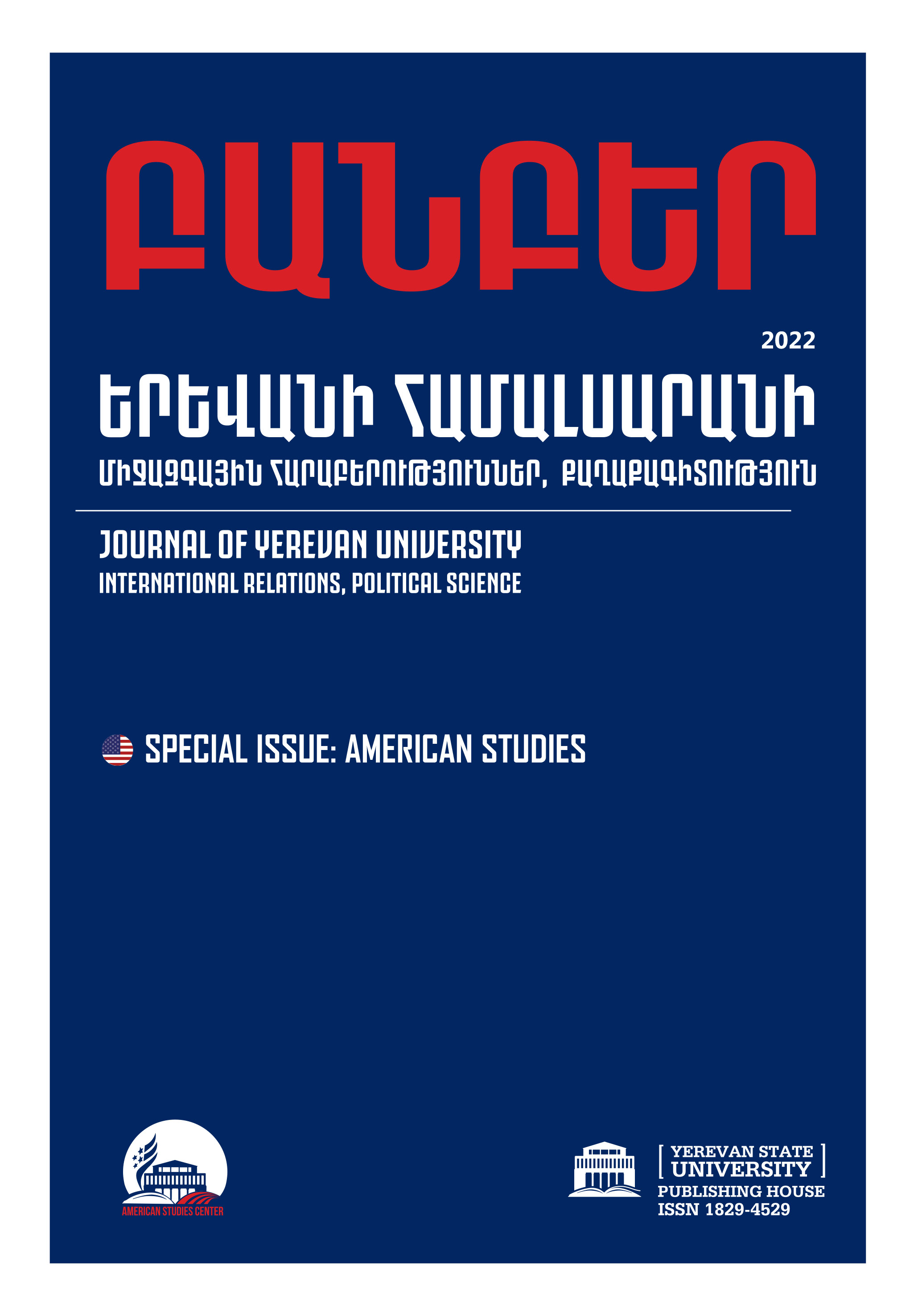The U.S. energy diplomacy challenges in the condition of world energy markets transformation (South Caucasus vector)
DOI:
https://doi.org/10.46991/BYSU:D/2022.sp1.015Keywords:
United States, energy, diplomacy, security, climate change, South CaucasusAbstract
The article considers the key aspects of the US energy diplomacy in the context of the transformation of the global energy market at the present stage. The main strategic documents of the U.S., affecting the problems of energy security and energy strategy, are studied. The features of the concepts of "energy dominance" (Trump) and "energy independence" (Nixon) are presented from the point of view of their implementation in the context of modern political and economic challenges. The structure of the U.S. energy balance is considered, which made it possible to determine the level of dependence on external supplies of hydrocarbon raw materials, especially oil. The priorities of the U.S. in the hydrocarbon market (both natural gas and oil) and renewable energy are studied through the prism of the climate agenda (in particular, the 2015 Paris agreement). Special attention is paid to the issues of liquefied natural gas (LNG) export from the U.S., especially towards European markets. The key risks and challenges of US energy diplomacy in the context of the conflict in Ukraine as well as geopolitical confrontation with Russia are identified. The US energy strategy in the South Caucasus is considered. The main features of the U.S. energy cooperation with Armenia, Georgia and Azerbaijan in the context of geopolitical challenges are revealed.
References
A National Security Strategy For a New Century. The White House. October. 1998
Blank S. (2021) What the Biden Administration Can and Should do in the South Caucasus. The Central Asia-Caucasus Institute and Silk Road Studies Program Joint Center. URL: https://www.cacianalyst.org/publications/analytical-articles/item/13661-what-the-biden-administration-canand-should-do-in-the-south-caucasus.html
Boersma T., Johnson C. U.S. Energy Diplomacy (2018). Columbia SIPA. Center On Global Energy Policy. URL: https://energypolicy.columbia.edu/sites/default/files/pictures/CGEPUSEnergyDiplomacy218.pdf
Boltuc S. (2022). Gli interessi dell’Iran nel Caucaso. SpecialEurasia. P. 25-26.
Cohen S. B. (2015). Geopolitics: The Geography of International Relations. Third Edition. Rowman & Littlefield. P. 37-54.
Davtyan V. (2018). New World Energy Order: The Obstacles to the Golden Age of American Energy Dominance. International Journal of Energy Economics and Policy, 8(4), 157-168.
Energy Policies of IEA Countries. United States. 2019 Review. September 2019. URL: https://www.iea.org/reports/energy-policies-of-iea-countries-united-states-2019-review
Energy Security Doctrine of the Russian Federation. Approved by Decree of the President of the Russian Federation of May 13, 2019, No. 216. URL: http://www.scrf.gov.ru/security/economic/energy_doc/
Energy Security Doctrine of the Russian Federation. Approved by Decree of the President of the Russian Federation of May 13, 2019 No. 216. URL: http://www.scrf.gov.ru/security/economic/energy_doc/
H.R.1453-European Energy Security and Diversification Act of 2019. URL: https://www.congress.gov/bill/116th-congress/house-bill/1453?q=%7B%22search%22%3A%5B%22H.+R.+83%22%5D%7D
Hongyuan Yu (2018). The U.S. Withdrawal From the Paris Agreement: Challenges and Opportunities for China. China Quarterly of International Strategic Studies. 04:02, p. 281-300. DOI: https://doi.org/10.1142/S2377740018500100
Joint Statement by President Biden and President von der Leyen on European Energy Security. June 27, 2022. URL: https://www.whitehouse.gov/briefing-room/statements-releases/2022/06/27/joint-statement-by-president-biden-and-president-von-der-leyen-on-european-energy-security/
Ladislaw S., Tsafos N. (2019). Energy Spheres of Influence. Center for Strategic and International Studies. URL: https://www.csis.org/analysis/energy-spheres-influence
Ladislaw S., Tsafos N. (2020). Race to the Top. The Case for a New U.S. International Energy Policy. Center For Strategic and International Studies. URL: https://www.csis.org/analysis/race-top-case-new-us-international-energy-policy
National Security Strategy of the United States of America. December 2017. URL: https://trumpwhitehouse.archives.gov/wp-content/uploads/2017/12/NSS-Final-12-18-2017-0905.pdf
Ravikumar, A.P., Bazilian, M., Webber, M.E. (2022). The US role in securing the European Union’s near-term natural gas supply. Nat Energy, 7, p. 465–467. DOI: https://doi.org/10.1038/s41560-022-01054-1
Renewable Energy // USAID. URL: https://www.usaid.gov/climate/renewable-energy
Renewing America’s Advantages. Interim National Security Strategic Guidance. March 2021. URL: https://www.whitehouse.gov/wp-content/uploads/2021/03/NSC-1v2.pdf
Rumer E., Sokolsky R., Stronski P. (2017). U.S. Policy toward the South Caucasus: Take Three. Carnegie Endowment for International Peace. P. 3-4.
Rumer E., Sokolsky R., Stronski P. (2017). U.S. Policy toward the South Caucasus: Take Three. Carnegie Endowment for International Peace. URL: https://carnegieendowment.org/2017/05/31/u.s.-policy-toward-south-caucasus-take-three-pub-70122
The Biden Plan for a Clean Energy Revolution and Environmental Justice. URL: https://joebiden.com/climate-plan/
The Long-Term Strategy of the United States. Pathways To Net-Zero Greenhouse Gas Emissions By 2050. November 2021. URL: https://www.whitehouse.gov/wp-content/uploads/2021/10/US-Long-Term-Strategy.pdf
The National Security Strategy of the United States. The White House. September. 2002.
U.S. Energy in the 21st Century: A Primer. Congressional Research Service. March 16, 2021. URL: https://crsreports.congress.gov/product/pdf/R/R46723
USAID Climate Strategy 2022-2030. April 2022. URL: https://www.usaid.gov/sites/default/files/documents/USAID-Climate-Strategy-2022-2030.pdf
Zabakhidze M., Gabriadze I., Beradze R., Khishtovani G. (2019). Connectivity, Trade and Financial Integration of the South Caucasus Via the Belt and Road Initiative (BRI). Caucasus Analytical Digest No. 111, 3-9.
Downloads
Published
Issue
Section
License
Copyright (c) 2022 Author(s) and the Journal Political Sciences:Bulletin of Yerevan University

This work is licensed under a Creative Commons Attribution-NonCommercial 4.0 International License.


